For anyone paying close attention to BookNotes, you may note that the last few appeared at our website (where they are forever archived) but didn’t hit subscriber’s email until several days later. There have been tech issues with the service we have that sends these book reviews to those who have subscribed, so we have secured a new (and hopefully more reliable) mail service provider. Not that most people care, but our BookNotes newsletter, from our Hearts & Minds bookstore blog, is now delivered to your inbox by MailPoet. Not a bad name for us to write a check out to each month.
And, more interestingly, you probably noticed some good books for Lenten reading that we shared last week, and some links to older BookNotes that announced other, older devotionals or studies for Lent. It’s not too late to order those at 20% off, ya know.
We realize that not everyone likes the page-a-day sort of devotional format even if you want to take some extra time to read reflectively this season. Not to worry: I’ve put together a list of a dozen or so other books (mostly new or recent) that might be good to pick up now as we shift gears and allow ourselves to be shaped into people that will take Holy Week seriously in about a month. Here are some books to help you on the journey of self reflection.
Please use the link to our order page shown at the bottom of this column. It will take you to our website’s secure order form; just follow the directions, telling us what you want and how you want it sent. We’ll do the rest, including a prompt reply confirming everything. Easy.
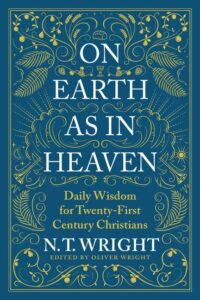 On Earth As In Heaven: Daily Wisdom for Twenty-first Century Christians N.T. Weight (HarperOne) $29.99 OUR SALE PRICE = $23.99
On Earth As In Heaven: Daily Wisdom for Twenty-first Century Christians N.T. Weight (HarperOne) $29.99 OUR SALE PRICE = $23.99
Not counting the books of his weekly lectionary resources, not since the 1998 Lenten-themed Fortress title Reflecting the Glory have we had a daily devotional from the prolific N.T.Wright, and never a year’s worth of short readings. This long-awaited anthology is a gem, lovingly curated by Tom’s son Oliver, culling good excerpts from his many Harper-published volumes. This is indeed a daily reader, and is arranged somewhat along the church calendar. Hooray. What a great, wonderful, even rare resource.
Here’s the fun thing: it starts with Easter. Knowing Wright’s large amount of work on the resurrection — its centrality to the Biblical story, its bodily historicity, its truest meanings and its creation-wide restorative power — it isn’t surprising, really, to have this collection start with resurrection. Naturally, if you get this now, you don’t have to start on page 1. I’d suggest opening to page 265 (which has his “Kingdom Translation” rendering of a New Testament text from 2 Corinthians) and then starts in earnest with readings from The Day the Revolution Began and Surprised by Scripture.
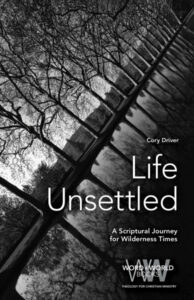 Life Unsettled: A Scriptural Journey for Wilderness Times Cory Driver (Fortress Press) 19.99 OUR SALE PRICE = $15.99
Life Unsettled: A Scriptural Journey for Wilderness Times Cory Driver (Fortress Press) 19.99 OUR SALE PRICE = $15.99
I just had to list this guide for journeying through “wilderness times” since that just shouts “Lent” to many of us. This paperback includes some honest spiritual autobiography and some solid (if creative) Bible reflection. The author is a staff person of a ELCA synod, directing the Transformation Leadership Academy. He spent fourteen years living and travelling in Morocco and Israel to understand how people make sense of living in physical wilderness. If you feel lost or confused and want sometime a bit deeper to help you reflect on this hallmark metaphor, this just might work for you.
I like this little bit from the publisher:
The Hebrew title of Numbers is Bemidbar, which means literally, “in the Wilderness.” In this oft-overlooked book are stories of God’s passionate intimacy and anger, communal formation and struggles, and personal failures and triumphs. The author shows how the wilderness journey in Numbers has deep relevance for our time and personal journeys.
I’ll put it on our shelf by the often-recommended Leaving Egypt: Finding God in the Wilderness Places by Chuck DeGroat (Faith Alive; $17.00.)
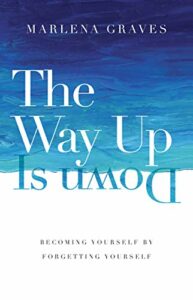 The Way Up Is Down: Becoming Yourself by Forgetting Yourself Marlena Graves (IVP) $22.00 OUR SALE PRICE = $17.60
The Way Up Is Down: Becoming Yourself by Forgetting Yourself Marlena Graves (IVP) $22.00 OUR SALE PRICE = $17.60
Beth and I have a real appreciation for this author, her writing, her leadership, her insight, and her friendly encouragement to us and so many others. She is the real deal, and it comes across in her prose that is both thoughtful and very significantly informed and yet conversational and approachable. She is an “every day mystic” that draws on the deepest wells of the contemplative spiritual tradition and yet lives it out in even prophetic ways, denouncing the abuse of power and standing with the marginalized. She brings together so many aspects of faithful contemporary discipleship that we are always happy to get a chance to highlight her books.
This title isn’t pitched as a Lenten read, but — whew! — it captures the themes of following Jesus, embracing his adventure of “downward mobility” and becoming a servant to others. (Think of Mark 10, right?) In The Way of is Down Marlena invites us to “the art of self forgetfulness) and promises that in this counter-intuitive way, we just might discover our truest selves.
One doesn’t have to be in the Lenten register to recall how very central to the gospel this upside-down wisdom really is. One doesn’t have to be considering how we follow Jesus to the cross to realize that his call to humility and servanthood is a hallmark of the Kingdom way.
This book won great accolades when it came out a year or so ago; we have announced it and celebrated it, but have been waiting for Lent in order to amplify its presence yet again. We are glad for this author, this book, and, the counter-cultural ways of Jesus. He promises this hard way as the doorway to life abundant. Read this book to be challenged to embrace it.
Read these, among many remarkably positive reviews:
I know of no one who cares less for the superficial ‘worries of this life’ (Mt 13:22) than Marlena Graves. She is a voice calling out in our generation, beckoning us to a vision of Christ that has nearly been drowned out by the rise of self-help pseudo-Christianity. And this book? This book is her heart on paper. If you want to sit under a spiritual giant, and if you want to remember just what kind of freedom we are called to in Christ, do not miss this message. — Sharon Hodde Miller, author of Nice: Why We Love to Be Liked and How God Calls Us to More
It is a rare and sacred gift for a writer to serve her raw heart–tender and salted with tears–to nourish the world. The Way Up Is Down is a profound act of Christlike service. Honest, poignant, and lyrical, this is a book that shows what it tells. It’s unforgettable, incisive, and deeply needed. Thank you, Marlena, for sharing your precious gift–your story, your yearning for a better way. I am inspired. — Paul J. Pastor, author of The Face of the Deep
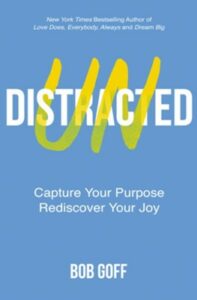 Undistracted: Capture Your Purpose, Rediscover Your Joy Bob Goff (Thomas Nelson) $26.99 OUR SALE PRICE = $21.59
Undistracted: Capture Your Purpose, Rediscover Your Joy Bob Goff (Thomas Nelson) $26.99 OUR SALE PRICE = $21.59
A new book by Bob Goff is almost a publishing event and while I admit to being just a tiny, tiny bit jaded about his endless enthusiasm and bundle-o-wonder joy, I love the guy and rolled my eyes and picked up the fabulously sky blue hardback. And, not surprisingly, I was hooked within pages and kept reading longer than I should have, wanting to hear his still-enchanting (and often hilarious) stories, and be challenged by his good sense, if risky, challenging, call to faithful, Christian-like living in ambitious pursuit of purpose. Like his previous Dream Big I wondered if I was too hold for this stuff. Beth and I pursued our dreams, too some hits, ended up starting a bookstore, which ended up a pretty good fit, or so people tell us. I don’t want to dream big, to be honest, unless it’s dreams of finding more time to read the books that have been stacking up in every room of the house for decades. I’m not sure I have it in me to dream big enough to get undistracted, since it seems fretting over my distractions have become my way of life.
Which is why I am not ashamed to admit that this upbeat, encouraging, honest bit of optimistic advice, without hardly any footnotes and nothing all that deep, is, well, more than a kick in the pants. It’s a holy call to be serious about one’s calling, one’s priorities and values and lifestyle. He promises a bit of happiness that might “transition into a deep and abiding joy with a longer shelf life.” Counter-intuitive as it might seem, this fun book is one helluva Lenten read.
We are distracted by our own fears and foibles. We are distracted by very real problems and limitations (Goff over and over acknowledges this, although his optimism could feel a bit dismissive if you feel called to lament and sorrow.) We are distracted by others who are intent on tearing us down; Bob gives good advice about not engaging with the cynics. We all have endless to-do lists and most of us scroll on our phones just a bit too much. The list of distractions, big and small, are endless.
Goff has an uncanny ability to make nearly anything a teaching moment. From some major heart problems to dashboard lights going out on a plane he was solo night-flying to the story of a high school wood-shop teacher missing some fingers, this guy can turn anything into a parable. I grate against zippy bromides and chicken-soup-for-the-soul happy thoughts, but, again — even though Undistracted may seem a bit like that, with its pithy stories, life-lessons, urgent advice, and all those analogies and metaphors (the book is, he tells us, like those rumble strips along the side of the road, reminding you if your drifting off course) and I could not put it down. (And props to him for the never-ending delight of finding lessons in nearly everything!) He has good stuff to say and it is important stuff, even profound, even if he’s too busy having fun and spinning his magic to say it is. It is. As it says on the back cover, “Bob shows you the way back to an audaciously attentive life.”
And he knows a bit about how this works. As he tells it he lived his youth in what he calls a “low-grade mediocrity.”
I suppose some of his stories come off better live, spoken, but they are still really good. What fun and delightful wordsmith he is. And he can just add a punchy word or clever line that’s a little unsuspected.
Speaking to young parents (or older grandparents) he says,
Change the ringtone on your cell phone to “Cat’s in the Cradle” sung by Harry Chapin. You’ll pick up the phone less and your kids more.
Among other suggestions, he says,
Get some wood and light a fire. Find some chairs and fill them with people you have’t connected with in a while, then watch the flames dance. Go ahead and get some smoke on your, and the next day your cloths will smell like a dozen great conversations.
Do you need reminded who you are, what kind of life you really want to live? It is not too late. Not for an old guy like me, and I’m sure not for you. Maybe you just need to leave behind some unhelpful stuff and learn to not be distracted, find some friends and press on. As he shares some pretty weird stuff from his own family (including hunting down a criminal who ended up being a long-lost relative!) you’ll want to be honest about what stories you tell about your own life. And you’ll be more generous with others. Maybe reading Undistracted is the Lenten practice you need. Highly recommended.
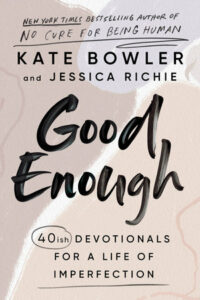 Good Enough: 40ish Devotionals for a Life of Imperfection Kate Bowler and Jessica Richie (Convergent) $21.00 OUR SALE PRICE – $16.80
Good Enough: 40ish Devotionals for a Life of Imperfection Kate Bowler and Jessica Richie (Convergent) $21.00 OUR SALE PRICE – $16.80
Okay, I just had to list this one right after Bob Goff’s fabulous call to live well, with joy and adventure, by being undistracted. He’s an optimist and a motivational life coach and he is a joy to behold. But what if you are dying of cancer. What then?
Well, Kate Bowler is more theologically trained than Goff (she teaches at Duke Divinity School) and she is more snarky and cynical before breakfast than Goff will be all week. He had her on his fabulously inspiring “Dream Big” podcast and they are now fast friends. I sometimes wonder if they are somehow related, like some whimsical good cop/bad cop sibs. (If you read Undistracted you’ll learn that Goff does have a bunch of scattered and apparently previously undiscovered relations.) They really do share a child-life joy in living and a simple faith that allows them to live into God’s Kingdom is freeing ways and they both love to laugh. I was kidding about them being related, though. She’s from Canada and he’s from California.
As a scholar of the heresy of the “name it and claim it” prosperity gospel (see her Oxford University Press book, Blessed) Bowler has little time for cliches and simple answers, religious or otherwise. In fact, upon receiving her very dire cancer diagnosis, she wrote two books debunking this harmfully cheery theology, Everything Happens for a Reason (And Other Lies I’ve Loved) and No Cure for Being Human (And Other Truths I Need to Hear.) There are honest, raw, full of faith, funny, and are very well-written memoirs of her life journey.
Which you all knew if you’ve followed BookNotes. Although we have announced it briefly, before, you may not know that Bowler’s new more-or-less 40 day devotional is now out. Co-written with Jessica Richie, it is called Good Enough. It embraces imperfection, revels in creatureliness, limitations, pain, suffering and our very human realities The hand sized hardback devotional has readings like “Buoyed by the Absurd” and “Mourning a Future Self and “When You Are Exhausted” and “Being Honest About Disappointment.” Yep, this is very clever, at times pretty fun, but it is also very serious, about “the burden of love” and what they call “the in-between.” There is a moving prayer for “when God seems absent.” The book opens with “A Blessing for a Joyfully Mediocre Journey.” Maybe this is a devotional you could use this Lent.
Blurbs on the back are from Sarah Bessy, Cole Arthur Riley, Barbara Brown Taylor, and Jeff Chu.
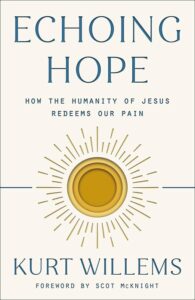 Echoing Hope: How the Humanity of Jesus Redeems Our Pain Kurt Willems (Waterbrook) $16.00 OUR SALE PRICE = $12.80
Echoing Hope: How the Humanity of Jesus Redeems Our Pain Kurt Willems (Waterbrook) $16.00 OUR SALE PRICE = $12.80
Well, this sure seems like a good thing to consider during Lent. We spend a lot of time leading up to thinking about the horrible last week of Jesus’s life, his saying goodbye to his friends, their lackluster support, their betrayals, the trial, the interrogation, the torture, the humiliation. Kurt Willems, a Seattle-based church planter (and host of the Theology Curator podcast) has reflected well, here, on this human-ness of Jesus. Even as the son of God, Jesus was not exempt from suffering — he felt real hunger and thirst, sadness and anger, he endured ridicule and all of this real stuff mattered to him.
This is a book about our own hardships and how, when life hurts, the “radical humanity” of Jesus can point us to hope. With a good foreword by New Testament scholar Scot McKnight, you know it can be counted on for being Biblically sound, reliable, solid, and creative enough to be interesting. For what it is worth (as McKnight notes) it is not saying that our own pain and suffering, in light of all this suffering of Jesus, is therefore “good” or redeemed. No, this “is not a book about how violence redeems but about the redemption on the other side of violence.”
Contemplative writer Mindy Caliguire says that this “careful look at pain in the context of Jesus’s life” could open up for you “avenues of discovery and healing.”
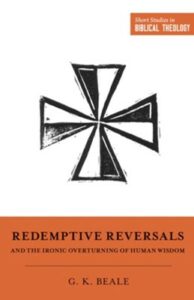 Redemptive Reversals and the Ironic Overturning of Human Wisdom G.K, Beale (Crossway) $14.99 OUR SALE PRICE = $11.99
Redemptive Reversals and the Ironic Overturning of Human Wisdom G.K, Beale (Crossway) $14.99 OUR SALE PRICE = $11.99
Not all faith traditions use this lingo, but for some there is a distinction to be made between “systematic theology” which studies abstract topics — the nature of God, the effect of sin, who Jesus is, what the atonement is, how we are to do church, the Spirit, ethics, what should we think about the end times, etc. Such theologians work out systems of logic that neatly teach through compilations of truth about these topics. And then there is what some call “Biblical theology”which seems more organic and creative, teaching theological themes as they emerge from the narrative of the Bible itself. Such approaches weave together the very literary structure of the whole Bible study from creation to new creation, seeing how themes unfold in the history of redemption.
I mention this because this book, Redemptive Reversals is part of a series of “Short Studies in Biblical Theology,” and many of them are really great — concise but meaty. I’m a fan of most of these in this series, and this recent one, by an amazing thinker who has written big books (such as one on our mission to “expand eden” and on the glory of God, about mystery, about the role of the temple, about idolatry, about the New Testament use of the Old) here gives us a great study that seems to be a very timely read as you prepare for thinking about Good Friday and Easter. The title says it all, eh? Throughout the Bible there are stories exactly about this, the irony of sensible human wisdom being overturned by the unexpected — even ironic! — victory of weakness over power. Beale unpacks this pattern throughout redemptive history.
The apostle Paul said that the gospel was foolishness to the Greeks and a stumbling block to the Jews. The gospel is just as scandalous and surprising today — or to use Greg Beale’s term, ironic. To encounter that irony is to stumble into strong evidence of the gospel’s divinity. Redemptive Reversals is overflowing with anecdotal illustrations, pastoral cautions, cultural connections, and practical applications. It’s a refreshing, unique, and important book all serious Bible students should have in their library. — J. D. Greear, author, What Are You Going to Do with Your Life?Pastor, The Summit Church, Raleigh-Durham, North Carolina
Greg Beale is one of the most perceptive and fascinating New Testament scholars of our day. He reads texts in their historical context, but he also illustrates how particular verses and passages fit into the larger storyline of the Scriptures. In this wonderfully accessible volume, Beale helps us to see that God often works in ways that we would not expect and uses unlikely and ironic means to accomplish his purposes. We see from Beale’s work that God is sovereignly working out his purposes and his will and that we can trust him with our lives.
— Thomas R. Schreiner, Professor of New Testament Interpretation, The Southern Baptist Theological Seminary, author, The Kingdom of God and the Glory of the Cross
 Gentle and Lowly: The Heart of Christ for Sinners and Sufferers Dane Ortlund (Crossway) $19.99 OUR SALE PRICE = $15.99
Gentle and Lowly: The Heart of Christ for Sinners and Sufferers Dane Ortlund (Crossway) $19.99 OUR SALE PRICE = $15.99
We have announced this several times at BookNotes, sharing a bit about it, highlighting why so many have said it is one of the most moving, serious books about the work of Christ they have ever read. It is a slow, meditative, Biblically careful study of the person of Jesus, his humility and kindness. It is about grace and goodness and about his work on the cross. It says it is mostly about His heart.
Dane Ortlund does this, I must say, by studying and reporting on the serious work of several Puritan preachers and writers (and near mystics, or so it seems to me.) He explores the heart of Jesus and his kind invitation to “come to me, all who are weary” by way of citing Thomas Goodwin and Richard Sibbes and John Owen. Goodwin wrote a book in the mid-1600s called The Heart of Christ. Sibbes most famous work, which we have carried for years, is The Bruised Reed (which alludes to the promise of God in Isaiah 42 assuring us that “a bruised reed I will not break.”) Obviously, if you have been meaning to read this very popular volume, now would be a good time. There’s a study guide, now, and a journal, and, published a few months ago, an intense sequel by Ortlund, simply called Deeper.
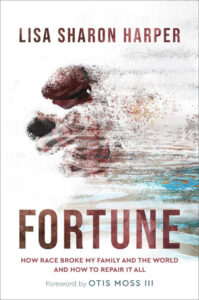 Fortune: How Race Broke My Family and the World —and How to Repair It All. Lisa Sharon Harper ( Brazos Press) $24.99 OUR SALE PRICE = $19.99
Fortune: How Race Broke My Family and the World —and How to Repair It All. Lisa Sharon Harper ( Brazos Press) $24.99 OUR SALE PRICE = $19.99
We have announced this a time or two, first inviting folks to pre-order it (thanks to those who did) and then, again, when it came out. I even mentioned it on that little video I did on facebook, the day This Here Flesh by Cole Arthur Riley released. And yet, I’ve still not done it justice. Fortune was a hard book to read in an odd way. It was not gratuitous about the pain of the whip or the fear of lynching that African Americans have felt in their very bodies and it was not even that detailed about the abuses poured upon people of color in the late 20th and today. No, the brokenness this book describes is plainspoken and informative, passionate, yet, but written in a restrained way, getting at the “way race broke my family” in a way that is inviting to all. Who doesn’t want to know something about their family ancestors? Who doesn’t get a bit touched by those Ancestory.com ads? And who doesn’t cheer for an underdog, facing plenty of obstacles in finding the backstory of family heritage. Those of us older enough to remember recall why Alex Haley’s Roots was such a huge best-seller, before and after the much-watched TV show that exposed all of American to the hard history of enslaved peoples here in so-called God’s country.
The title of this book is the name of a relative of Lisa’s, one whose story she traces in one of several chapters, each bearing the name of an ancestor. The book is mostly a family story, but it is grounded in the present as Lisa wonderfully describes her journey to archives and websites and museums and follows old roads to find old homesteads and imagine that this, this, this right here was where some relatives once lived. Most of the book is set in the past but she narrates it through the three decades it took her to explore ten generations.
In this way readers are drawn in, eager to know more, almost as Lisa herself was piecing it together, finding this true story, recalling that anecdote, holding on to that family heirloom, discovering these records or those news clippings. It is common enough stuff, but she tells it well. She has us on the edge of our seats in a few sentences about waiting for DNA results.
But — let us speak honestly, here — most white or even non-white Americans who do their ancestry detective work, do not have to consult purchase orders and billing ladings for the purchase of their ancestors. And for black people in America, this damnable fact is true: most family records are smeared and smudged (metaphorically but perhaps literally) with blood. Lisa does not overstate the horror of this, looking up records of who was purchased by whom, and only hinted at how it made her feel to do this particular kind of detective work. It is, though, what makes Fortune a different sort of book than most others who have told their dramatic story of finding their ancient relatives and where in the older worlds they came from. In this sense, Fortune is gut wrenching, not because Lisa is melodramatic or overstated; again, she is not. Still, it is, as they say, what it is.
And some of what it is, is exciting and lovely, learning about great-greats, marriages, travels, and the birth of little ones. She learns of cousins and stories of creativity and endurance. Lisa weaves her family member’s stories in with her own, placing it all in the context of the unfolding history of modern times. Ms. Harper has been through a lot — we have gotten hints of some of it in her Very Good Gospel. There is more revealed in Fortune. The great Ruby Sales has a blurb on the back simply saying that “Harper is a masterful storyteller.” Amen to that.
I had read this in an advanced manuscript, and when the hardbacks came we were delighted, but I had my spiral bound manuscript all marked up and pages dog-eared. So I didn’t open the hardback right away and then I discovered the bonus — there are photographs of some of the people she writes about (Lee Ballard, born in 1836, Phillip Fortune, born in 1835, Reinaldo and Anita Weekes (wearing a great hat), up through a fabulous picture of Lisa’s mom Sharon Lawrence with Lisa as a baby, a picture taken in 1969.) You will actually lay eyes on Hiram, who you have read about, and Richie Lawrence and Willa Belle Jenkins visiting Junias on a military base in Michigan during WWII. I’m not usually a fan of pictures of people we don’t know in an autobiography but these are the people this book is about. I was so excited to see these, and it drew me back into the book for my second reading.
There is some very good stuff as the story draws to a close about repair. Obviously no simple religious “reconciliation” will do without a full account of truth and justice. She explores the meaning of guilt and the nature of forgiveness. She writes helpfully a bit about reparative justice. She cites a few good public theologians and social ethicists (and of course, tells of Desmond Tutu’s important work in South Africa, citing his powerful No Future Without Forgiveness.) Her message about the beloved community is moving and compelling and not without a challenge to be more active to the work.
Which makes this, my friends, a great book to read any time, but perhaps especially as a Lenten practice, to enter in to the story of another with such intentionality, to learn what she learns, to care, to be challenged.Is if fair to say this is, in some way, part of all of our stories, for better or worse? We owe Lisa a debt of gratitude. She waded in (as Sweet Honey in the Rock sing it, citing Harriet Tubman.) As one writer put it, “Fortune recovers the beauty of her heritage, exposes the brokenness that race has wrought in America, and casts a vision for collective repair.”
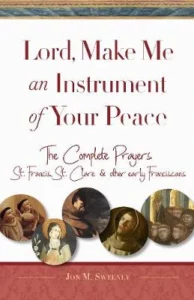 Lord, Make Me An Instrument of Your Peace: The Complete Prayers of St. Francis, St. Clare, and other early Franciscans Jon M. Sweeney (Paraclete Press) $25.00 OUR SALE PRICE = $20.00
Lord, Make Me An Instrument of Your Peace: The Complete Prayers of St. Francis, St. Clare, and other early Franciscans Jon M. Sweeney (Paraclete Press) $25.00 OUR SALE PRICE = $20.00
Jon Sweeney has written so many interesting books over the years and we carry much of his work. An early book about the medieval worldview illustrated by studies of cathedrals was fascinating. I loved his memoir The Lure of Saints which pushed to be, as another book put it, “almost Catholic.” He is known as a biographer, and has done books about the lives (or the teachings of) Saint Patrick, Thomas Merton, G. K. Chesterton, Black Elk, Mary the mother of Jesus, St. Catherine, Meister Eckhart, even contemporaries James Martin and Phyllis Tickle. He has devoted more time and has published more volumes, though, about Francis and Clare. He knows them very well. (Another new book came out that we noted a few months back that, come to think of it, would make a good Lenten read as well: Feed the Wolf: 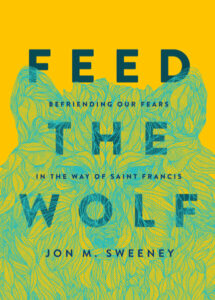 Befriending Our Fears in the Way of Saint Francis [Broadleaf Books; $26.99.]) Again, Sweeney knows this Franciscan stuff very well.
Befriending Our Fears in the Way of Saint Francis [Broadleaf Books; $26.99.]) Again, Sweeney knows this Franciscan stuff very well.
Which is why this prayer book is so amazing. Sweeney has painstakingly found and studied and prayed and compiled great prayers by Francis and Clare and others in their medieval orbit (such as the inimitable Brother Juniper and St. Anthony of Padua.) This volume collects those and prints them liturgically, as litanies and in the style of an office. Yes, the Franciscans served the poor and sang and danced and are not known for Benedictine type prayer cycles or great silences. But here it is. You can pray these for yourself, or in your family or group, or you can just read them for the fascinating historical record. Lord, Make Me An Instrument is a major contribution to this sort of literature, compiling in one affordable (and nicely made) paperback, all these many prayers.
There is much other content in the book, too, lots of interesting chapters about Francis, about Clare, about the other characters who followed them — about their prayer lives, how to “pray alongside” them, and even a chapter called “prayer in 13th century Europe.” Okay, maybe it isn’t for everybody, but I’m sure some Hearts & Minds customers will find this spell-binding.
Maybe being a bit of a holy fool would suit you well this season, loving God with greater abandon and praying more deeply, even learning to be used “as an instrument of your peace.”
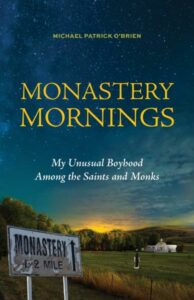 Monastery Mornings: My Unusual Boyhood Among the Saints and Monks Michael Patrick O’Brien (Paraclete Press) $18.00 OUR SALE PRICE = $14.40
Monastery Mornings: My Unusual Boyhood Among the Saints and Monks Michael Patrick O’Brien (Paraclete Press) $18.00 OUR SALE PRICE = $14.40
I wanted to list at least one spiritual memoir for those who like just watching over the shoulder as one ordinary person narrates his or her life, and how they came to grow in faith and discipleship. This book seems like a good one to suggest here, ruminating as it does about the faith this book experienced as he hung out with monks at a nearby monastery in his rural Utah.
Yep, you read that right: one doesn’t immediately think of Catholics, let alone monks, living in Christian community in the land of Mormons and the great Western landscapes. But, yes, in the mid 1900s some Catholic pioneers — Trappists! — intended to form a contemplative monastery right there (as Jana Riess puts it) “in the unlikely soil of Mormon country.” Riess continues, telling of Patrick O’Brien’s 1970s boyhood in Utah, “O’Brien captures the expansive spirit of late twentieth-century Catholicism in America and the loving warmth of the monks who befriended him.”
Monastery Mornings has been described as a “love letter to a community of Trappist monks who provided family when a young boy needed it most.”
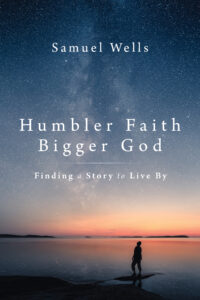 Humbler Faith, Bigger God: Finding a Story to Live By Samuel Wells (Eerdmans) $22.99 OUR SALE PRICE = $18.39
Humbler Faith, Bigger God: Finding a Story to Live By Samuel Wells (Eerdmans) $22.99 OUR SALE PRICE = $18.39
You have heard of people “deconstructing” faith. You’ve heard of the “spiritual but not religious” and now, the “Nones.” Certainly we have highlighted books here about these concerns, recently, the must-read When Everything’s On Fire: Faith Forged from the Ashes by Brian Zahnd or After Doubt: How to Question Your Faith Without Losing It by A. J. Swoboda. We are eager to see the soon to be released book by Brian McLaren called Do I Stay Christian? A Guide for the Doubters, the Disappointed, and the Disillusioned (coming in May 2022) which will be a sequel to Faith After Doubt: Why Your Beliefs Stopped Working and What to Do about It. Although to a more limited audience we have highly recommended Struggling with Evangelicalism: Why I Want to Leave and What It Takes to Stay by third-culture kid Dan Stringer.
Enter, now, one of the more thoughtful writers of our day, Samuel Wells, vicar of Saint Martin-in-the-Fields, London. (You may know him from a stint as the head of the chapel at Duke Divinity School and author of many, many books. And we have most of ’em.) In Humbler Faith, Bigger God, Rev. Wells shows a different way into this conversation, an honest but bracing call to continue on in Christian discipleship without the pressures of certainty and hubris.
As the publisher notes, Wells offers a “reframing of Christianity that portrays traditional belief and the response of skepticism as two rival stories and offers a third story that incorporates doubts and failures into a renewed understanding of Christian faith.”
Wells is replying to the common criticisms that the church has perpetrated injustices and intolerances of all sorts, that religion is a “crutch” and “drug” and full of endless narcissism. Chapter by chapter he takes on one of these popular accusations, and offers an eloquent call to honest, historic faith, but one that is flexible enough to appeal to the cynic and the hurting, this redemptive “reframing.” Wow, what a balancing act!
Does he get it right?
Read these comments for some indication:
A book at once incisive, wise, compassionate, and deeply devout. Wells avoids with equal agility the traps of empty dogmatism and empty faddishness, never forgetting that it is the love of God and neighbor–on which depend all the Law and the Prophets–that provides the proper key to any interpretation of the Christian mystery. — David Bentley Hart, author of Tradition and Apocalypse: An Essay on the Future of Christian Belief
I’m not sure who else alive could have written this book. Scholars are not usually this accessible. Pastors not usually this sharp-eyed. Critics not usually this devastating. Advocates not usually so beautiful. This unusual book calls to mind Augustine’s heart, Aquinas’s mind, Day’s activism, Temple’s leadership. You say I exaggerate? Take up and read before you tell me I’m wrong. — Jason Byassee, coauthor of Following: Embodied Discipleship in a Digital Age
God has surely heard it all: the complaints, the objections, the silence of a back turned on faith. Samuel Wells asks us — those of us who still believe that God can be found in Christian faith and its expression — if we have taken seriously the protests of our disbelieving neighbors. Now is the time for humility, church. Now is the time to listen. Now is the time for us to put up or shut up. Humbler Faith, Bigger God is here to help. — Katie Hays, author of God Gets Everything God Wants
Samuel Wells gets right to the heart of real questions people struggle with and the real challenges the church and the Bible raise for thinking people. He addresses all this with honesty, humility, intelligence, and love. This book is for seekers, doubters, questioners, and those who wonder what faith might mean in these days. — Heidi B. Neumark author of Sanctuary: Being Christian in the Wake of Trump
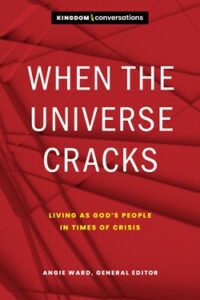 When the Universe Cracks: Living as God’s People in Times of Crisis edited by Angie Ward (NavPress) $16.99 OUR SALE PRICE = $13.59
When the Universe Cracks: Living as God’s People in Times of Crisis edited by Angie Ward (NavPress) $16.99 OUR SALE PRICE = $13.59
With the pandemic, the threats of global warming, climate crisis, financial meltdowns, and social polarization, it seems there is strife and trouble everywhere. Do you sometimes wonder what leaders are reliable to help you follow Jesus through this current crisis? Who can you trust? Where can we get some serious help in thinking about all this that isn’t a 500-page philosophical tome or an ideologically driven screed? From women and men doing good work in good ministry with real wisdom to offer?
If you could find such a collection of wise voices, it might be a Lenten practice to slowly work through them, maybe one each week. Who knows? Could this be a Lent book for 2022?
When the Universe Cracks is a sweeping, multifaceted look at the role of crisis in the life of faith from an esteemed gathering of pastors, faith leaders, and experts. You’ll find honest and realistic reflections to help you navigate present trouble or anticipate changes — a skill we’ve all realized these past years that we need to cultivate. Inspired by the global pandemic, these writers examine the whole history of God’s people (and how social crises was handled in the Bible) and offer a fresh perspective for every time the universe cracks. Good accessible reflections, honest, evangelical, engaging.
Scholar and church leader Angie Ward facilitates this energizing and fascinating discussion. Thought leaders Jo Anne Lyon, Efrem Smith, Christine Jeske, D. A. Horton, Kyuboem Lee, Marshall Shelley, Matt Mikalatos, Sean Gladding, Catherine McNiel, and Lee Eclov each contributed a chapter. We’re impressed and wanted to offer it here with other books that are timely, a bit sobering, maybe useful for a month such as this.
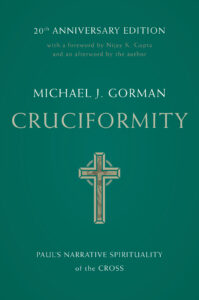 Cruciformity: Paul’s Narrative Spirituality of the Cross 20th Anniversary Edition Michael J.Gorman (Eerdmans) $40.00 OUR SALE PRICE = $32.00
Cruciformity: Paul’s Narrative Spirituality of the Cross 20th Anniversary Edition Michael J.Gorman (Eerdmans) $40.00 OUR SALE PRICE = $32.00
What could be more Lenten than reflecting upon how the cross of Christ figures into Christian discipleship? About how our spirituality should be cruciform? About how the Bible itself — in this case, mostly Paul — uses this notion as a key to understanding our faith and lives? You may know that I named this one of the Best Books of 2021, but it just seems fitting that for any reader who is used to reading somewhat thick and scholarly prose, that this could be your version of a Lenten devotional.
Here is some of what I wrote a BookNotes a few weeks ago when celebrating this recent anniversary edition of a contemporary classic of New Testament studies:
Speaking of Best Books and celebrations and Dr. Michael Gorman: it was twenty years ago his profound and game-changing work Cruciformity: Paul’s Narrative Spirituality of the Cross came out. This past year, Eerdmans released an expanded edition, called the 20th Anniversary edition, with a new foreword by Nijay Gupta (which is fascinating) and a very lengthy new chapter by Gorman, giving a bit of the backstory to his work, how Cruciformity came about and how it was received, and some new updated of things he has considered since 2001 when the first edition came out. Certainly this new edition deserves a special place on any list of important books done in Biblical research this year.
Michael Gorman is that rare scholar who can write for both the academy and the church. Cruciformity is a gift to both. Gorman offers in readable form a thorough study of how the crucifixion of Jesus remakes Paul’s understanding of God and undergirds his views of what it means to be in Christ. In its exploration of how the apostle experienced God’s love and grace through ‘the strange story of Christ crucified, ‘ Cruciformity charts a path for how that story might continue to shape daily lives today, in cruciform faith, hope, love, and power. — Rebekah Eklund, Loyola University Maryland, author of The Beatitudes Through the Ages
Thanks to Michael J. Gorman, ‘cruciform’ has come to describe the architecture of Christian community even more than the architecture of Christian buildings, with the term becoming an essential lens through which we view the apostle Paul’s pastoral theology. Cruciformity is an indispensable resource because Gorman’s careful scholarship and pastoral concern mirror the apostle Paul’s own efforts to illuminate the implications of Jesus’s ignominious public lynching. Bible teachers and students should keep Cruciformity nearby as a handy reference whenever studying Paul’s writings. — Dennis R. Edwards, North Park Theological Seminary, author of Might from the Margins
TO PLACE AN ORDER
PLEASE READ THESE REMINDERS AND THEN CLICK ON THE “ORDER” LINK BELOW.
It is helpful if you would tell us how you prefer us to ship your orders. The weight and destination of your package varies but you can use this as a general guide.
There are generally two kinds of US Mail options, and, of course, UPS. If necessary, we can do overnight and other expedited methods, too. Just ask.
- United States Postal Service has the option called “Media Mail” which is cheapest but slow and may be delayed. For one book, usually, it’s about $3.50.
- United States Postal Service has another option called “Priority Mail” which is $8.35 if it fits in a flat rate envelope. Many children’s books and some Bibles are oversized so that will take the next size up with is $8.95. “Priority Mail” gets much more attention than does “Media Mail” and is often just a few days to anywhere in the US.
- UPS Ground is reliable but varies by weight and distance and may take longer than USPS. We’re happy to figure out your options for you once we know what you want.
– DON’T FORGET TO LET US KNOW WHAT SHIPPING METHOD YOU PREFER –
HELPFUL HINT: If you want US Mail, please say which sort — Media Mail or Priority Mail — so we know how to serve you best. If you say USPS or “regular” we’re left scratching our noggins.
BookNotes
SPECIAL
DISCOUNT
20% OFF
ALL BOOKS MENTIONED
+++
order here
this takes you to the secure Hearts & Minds order form page
just tell us what you want to order
inquire here
if you have questions or need more information
just ask us what you want to know
Hearts & Minds 234 East Main Street Dallastown PA 17313
read@heartsandmindsbooks.com
717-246-3333
We are still closed for in-store browsing due to our commitment to public health and the common good (not to mention the safety of our staff and customers.) The vaccination rate here in York County is sadly lower than average and the hospitals are still crowded. Our store is a bit cramped without top-notch ventilation so we are trying to be wise and faithful.
Please, wherever you are, do your best to be sensitive to those who are most at risk.
We are doing our famous curb-side customer service and can show any number of items to you if you call us from our back parking lot. We are eager to serve and grateful for your patience as we all work to mitigate the pandemic.
Of course, we’re happy to ship books anywhere. Just tell us how you want them sent.
We are here 10:00 – 6:00 EST / Monday – Saturday, closed on Sunday.

